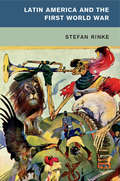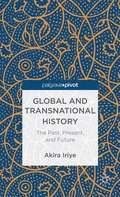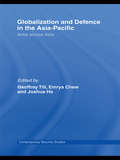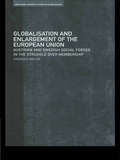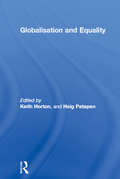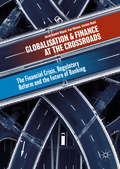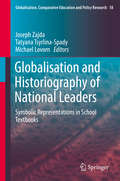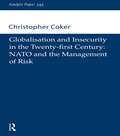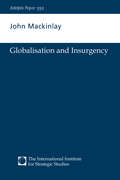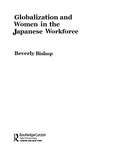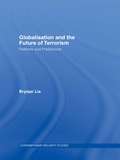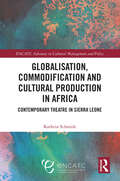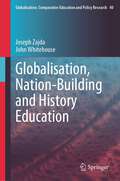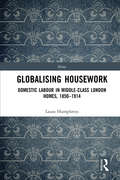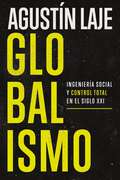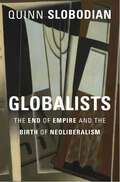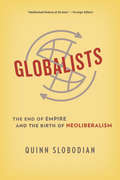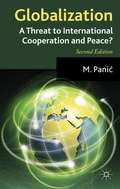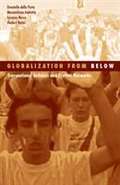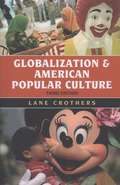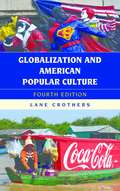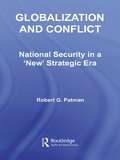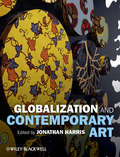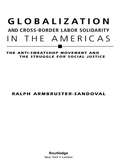- Table View
- List View
Global and International History: Latin America and the First World War
by Reid Rinke Stefan Reid Christopher W. Stefan RinkeUsing a broad variety of textual and visual sources, Latin America and the First World War goes beyond traditional diplomatic history and analyzes the global dimension of the history of the Great War. Filling a significant gap in transnational histories of the war, Stefan Rinke addresses political, social, and economic aspects as well as the cultural impact of the war on Latin America and vice versa. Rinke's meticulous research is based on sources from the nineteen independent states of the entire subcontinent and promises to be the most comprehensive examination to date of Latin America before, during, and immediately after the war.
Global and Transnational History
by Akira IriyeIt is no exaggeration to say that the study of history has been transformed significantly during the last twenty-odd years. Akira Iriye, the world authority on transnational history, examines the emergence and growth of global and transnational history, away from more traditional, nation-centred perspectives.
Globalisation and Defence in the Asia-Pacific: Arms Across Asia (Contemporary Security Studies)
by Geoffrey Till Emrys Chew Joshua HoThis edited volume examines the impact of globalisation on the economies, security policies and military-industrial complexes of the Asia-Pacific region. The work is structured into three main parts. The first explores globalization and its general effects on the policy-making of the nation-state; the second section looks at how globalisation affects a country’s threat perception and defence posture within the specific context of the Asia-Pacific region; while the third explores how it impacts on a state’s allocation of resources to defence, and how economic globalization affects the defence industry, with specific reference to the procurement policies and practices of different states across the Asia-Pacific.
Globalisation and Enlargement of the European Union: Austrian and Swedish Social Forces in the Struggle over Membership (Routledge Studies in Globalisation)
by Andreas BielerOn January 1 1995, Austria and Sweden joined the European Union (EU). This book examines why these two countries joined at such a moment and studies their accession against the structural background of globalization. In this cutting-edge analysis, Andreas Bieler argues that conventional neo-functionalist and intergovernmentalist theories fail to explain such structural change as they take existing power structures as given. Therefore, he develops a neo-Gramscian perspective as an alternative approach to European integration.
Globalisation and Equality (Challenges of Globalisation #Vol. 1)
by Keith Horton Haig PatapanIs globalisation creating a more unequal world? Is it creating new forms of inequality? Does it make certain pre-existing forms of inequality more morally or politically significant than they would otherwise have been?Globalisation and Equality examines these and related questions, exploring the way increasing globalisation is challenging our conceptions of equality. The contributors explore these themes from both theoretical and empirical perspectives. Some adopt a more abstract approach, exploring foundational questions concerning the meaning of equality, its social and political dimensions, and more specifically its moral implications in a global context. Others engage the general themes of globalisation and equality by focusing on specific topics, such as welfare, citizenship, gender, culture, and the environment.Original in the questions it poses, and interdisciplinary in its approach, this collection of essays will appeal to all those with an interest in globalisation and equality.
Globalisation and Finance at the Crossroads: The Financial Crisis, Regulatory Reform and the Future of Banking
by Paul Atkinson Adrian Blundell-Wignall Caroline RouletGlobalisation and the governance of the international financial system have arrived at the crossroads, where either a coherent level playing field for the cross-border activities of banks and multinational enterprises is settled upon, or the risk of another crisis will build up again. This book will explore the underlying problems alongside inconsistent economic and financial trends as a guide for researchers, advanced students and professionals to think about the interconnectedness of the factors involved. Readers will gain insights drawn from recent developments in economic theory and empirical research—a toolkit to help them in their future careers in economics and finance—illustrated with an analysis of the 2008 crisis and its aftermath.
Globalisation and Historiography of National Leaders
by Joseph Zajda Tatyana Tsyrlina-Spady Michael LovornGlobalisation and Historiography of National Leaders: Symbolic Representations in School Textbooks, the 18th book in the 24-volume book series Globalisation, Comparative Education and Policy Research, explores the interrelationship between ideology, national identity, national history and historical heroes, setting it in a global context. Based on this focus, the chapters represent hand-picked scholarly research on major discourses in the field of history textbooks and symbolic representations of national heroes, and draw upon recent studies in the areas of globalisation, history textbooks, and national leaders. A number of researchers have written on the importance of teaching national history in order to foster national identity and a sense of belonging to a certain society, state, and people among the younger generation. Some nations prefer to create national heroes out of their political leaders who are still in power, and whose lives and reputation are portrayed as being eminently spotless. Using diverse comparative education paradigms from critical theory, social semiotics, and historical-comparative research, the authors analyse the unpacking of the ideological agenda hidden behind the choice and lionization (or silencing) of the preferred national heroes. They provide an informed critique of various historical narratives depicting national leaders and national heroes. The book provides an easily accessible, practical yet scholarly source of information on international concerns in the field of globalisation, history education and policy research. Offering an essential sourcebook of ideas for researchers, history educators, practitioners and policymakers in the fields of globalisation and history education, it also provides a timely overview of current changes in politically correct history education narratives in history textbooks.
Globalisation and Insecurity in the Twenty-First Century: NATO and the Management of Risk (Adelphi series #345)
by Christopher CokerDiscusses the impact of globalisation on security in the West and in particular the way it has changed the nature of NATO as well as its security agenda.
Globalisation and Insurgency (Adelphi series)
by John MackinlayThe central proposition of this book is that global changes have altered the nature of insurgency by weakening some governments and empowering the forces that seek to overthrow them. The book identifies four distinct categories of insurgent force, and concludes that globalisation of insurgency leads inexorably to the globalisation of counter-insurgency.
Globalisation and Women in the Japanese Workforce (The University of Sheffield/Routledge Japanese Studies Series)
by Beverley BishopGlobalisation and Women in the Japanese Workforce contributes to the debate about the impact of globalisation upon women. It examines the effect of restructuring upon women's employment in Japan and describes the actions women are taking individually and collectively to campaign for change in their working environment and the laws and practices regulating it.
Globalisation and the Future of Terrorism: Patterns and Predictions (Contemporary Security Studies)
by Brynjar LiaThis new study is devoted to understanding how international terrorism is shaped, how it evolves and what we can expect in the future. Drawing upon research and methods outside the traditional focus, and by taking both a theoretical approach and a new practical predictive perspective, it delivers a fresh and fascinating contribution to terrorism studies. While predicting terrorism is a highly speculative business, there are ways of identifying certain long-term causes, driving forces and their links with society. Terrorists are usually integral players in local and sometimes global politics. Hence, when the local, regional and international contexts change, so does terrorism. Thoroughly reviewing the body of literature on the causes of terrorism, this study also combines predictive and futuristic analyses on globalisation, supported by a range of key case studies. It spans from the transformation of international relations, the globalisation of the market economy, demographic factors, ideological shifts and technological changes. The result is a set of key conclusions about the future patterns of terrorism, which are not simply best guesses, but also backed up by solid research. This book will be of great interest to all students and scholars of terrorism, globalisation, politics and international relations.
Globalisation and the Roman World
by Martin Pitts Miguel John VersluysThis book explores a new perspective for understanding the Roman world, using connectivity as a major point of departure. Globalisation is apparent in increased flows of objects, people and ideas and in the creation of translocal consciousness in everyday life. Based on these criteria, there is a case for globalisation in the ancient Roman world. Essential for anyone interested in Romanisation, this volume provides the first sustained critical exploration of globalisation theories in Roman archaeology and history. It is written by an international group of scholars who address a broad range of subjects, including Roman imperialism, economics, consumption, urbanism, migration, visual culture and heritage. The contributors explore the implications of understanding material culture in an interconnected Roman world, highlighting several novel directions for future research.
Globalisation, Commodification and Cultural Production in Africa: Contemporary Theatre in Sierra Leone (ENCATC Advances in Cultural Management and Policy)
by Kathrin SchmidtThis book engages with contemporary cultural production in Africa, focusing on theatre in Sierra Leone as main case study. The author provides coverage of, and insights into, such themes as cultural globalisation, commodification, the global creative economy, culture and development, international relations and contemporary cultural production in Sierra Leone within the context of local and global flows of people, media, images, technologies, finance and ideas. Combining the analysis of theatre in Sierra Leone and its aesthetics with its policy, structural and institutional context, this book highlights in much detail and nuance the interconnectedness between the micro- and the macro-levels of cultural production, between the local and the global, and between aesthetics, politics, policy, governance structures and institutions. This book links the particular findings from the author’s fieldwork to larger issues of contemporary local cultural production within the context of globalisation, commodification and decolonisation; adds a postcolonial perspective to existing theories and approaches to cultural production, management and policy, which is still largely missing from the existing discourse; and also contributes to addressing the gap in the knowledge about the context of contemporary cultural productions in diverse African contexts. This book will be particularly useful for both theatre scholars with an interest in the political economy of theatre and, more broadly, those seeking to understand the nuanced challenges and opportunities faced by policymakers, artists and arts managers to embrace the cultural and creative industries in this context. It also offers excellent insights for policymakers who wish to improve their understanding and interventions beyond superficial ‘best practice’ snippets and simplified ‘success stories’.
Globalisation, Nation-Building and History Education (Globalisation, Comparative Education and Policy Research #40)
by Joseph Zajda John WhitehouseThis book uses historiography and discourse analysis to provide a new insight into understanding the nexus between ideologies, the state, and nation-building—as depicted in history school textbooks. It focuses on the interpretation of social and political change, significant events, and examining possible new biases and omissions in school textbooks. The ‘Europeanization’ of history textbooks in the EU is an example of western-dominated Grand Narrative of pluralist democracy, multiculturalism, and human rights, according to the canon of a particularly European dimension. Various public debates in the USA, China, the Russian Federation (RF), Japan, and elsewhere, dealing with understandings of a nation-building, national identity, and history education point out to parallels between the political significance of school history and the history education debates globally.The book demonstrates that the issue of national identity and balanced representations of the past continue to dominate the debate surrounding the goals, dominant ideologies and content of history textbooks, and historical narratives. It concludes that competing discourses and ideologies will continue to define and shape the nature and significance of historical knowledge, ideologies and the direction of values education in history textbooks. This book provides an easily accessible, practical, yet scholarly insights into local and global trends in the field of history education, and should be required reading for a broad spectrum of users, including policy-makers, academics, graduate students, education policy researchers, administrators, and practitioners.
Globalising Housework: Domestic Labour in Middle-class London Homes,1850-1914 (Home)
by Laura HumphreysThis book shows how international influences profoundly shaped the ‘English’ home of Victorian and Edwardian London; homes which, in turn, influenced Britain’s (and Britons’) place on the world stage. The period between 1850 and 1914 was one of fundamental global change, when London homes were subject to new expanding influences that shaped how residents cleaned, ate, and cared for family. It was also the golden age of domesticity, when the making and maintaining of home expressed people’s experience of society, class, race, and politics. Focusing on the everyday toil of housework, the chapters in this volume show the ‘English’ home as profoundly global conglomeration of people, technology, and things. It examines a broad spectrum of sources, from patents to ice cream makers, and explores domestic histories through original readings and critiques of printed sources, material culture, and visual ephemera.
Globalismo: Ingeniería social y control total en el siglo XXI
by Agustin LajeDesvela los mecanismos ocultos de la dominación mundial con Globalismo: Ingeniería social y control total en el siglo XXI. El exitoso autor Agustín Laje desentraña magistralmente la malvada realidad de nuestro mundo moderno e ilumina las tinieblas de las fuerzas de poder que tratan de controlar a la humanidad. El globalismo no es globalización, sino una demoledora ideología que supone el más ambicioso proyecto de ingeniería social y control total en curso. Institucionalizada en organizaciones que, por definición, no tienen ni patria, ni territorio ni pueblo, esta ideología pretende parir un régimen político antidemocrático de alcance global. Así la soberanía de las naciones se redistribuye entre organizaciones supranacionales como el Foro Económico Mundial o la ONU con su Agenda 2030, liberadas de las limitaciones de los intereses particulares de los pueblos, para coordinar las transformaciones necesarias para nuestra «supervivencia». El globalismo también propone nuevas formas de legitimidad basadas en la tecnocracia y la supuesta filantropía de organizaciones como la Fundación Gates, la Open Society de Soros, y la Fundación Rockefeller.En esta obra, Agustín Laje explica magistralmente el origen y la formación del contrato social de nuestros Estados nacionales sobre una base democrática, mostrando cómo el globalismo busca culpabilizar estas estructuras para llevarnos a un callejón sin salida, donde todo se cede a una gobernanza global no representativa, la máxima expresión de la oligarquía de unos pocos privilegiados a los que nadie votó, y que ante nadie rinden cuentas pero que pretenden dirigir el destino del planeta.El autor llama a todos los actores sociales, políticos, religiosos e intelectuales a unirse contra el globalismo. La paradoja de que los patriotas olviden sus fronteras para esta batalla cultural adquiere un nuevo significado. Conocer la verdad y denunciar la mentira es un arma valiosa que este libro ofrece.GlobalismUncover the secret workings of world domination with Globalism: Social Engineering and Total Control in the 21st Century. Best-selling author Agustín Laje masterfully unravels the sinister reality of our modern world and sheds light on the darkness of the forces of power that seek to control humanity.Globalism is not globalization, but rather a devastating ideology representing the most ambitious social engineering and total-control project currently underway.Institutionalized by organizations such as the World Economic Forum or the UN with its Agenda 2030, Globalism also promotes new forms of legitimacy based on &“technocracy&” and the supposed philanthropy of organizations such as the Gates Foundation, Soros&’ Open Society, and the Rockefeller Foundation.In this book, Agustín Laje skillfully explains the origin and formation of the social contract of our nation-States based on democracy, demonstrating how globalism seeks to blame these structures in order to steer us into a dead-end, where everything is handed over to a non-representative global governance. This represents the ultimate expression of an oligarchy formed by a few privileged elites who were elected by no one and are accountable to nobody, yet aim to dictate the destiny of the planet.The author calls on all social, political, religious, and intellectual figures to unite against globalism. The paradox of patriots disregarding their borders for this cultural battle takes on a new significance. Knowing the truth and denouncing the lie is a valuable weapon that this book offers.
Globalists: The End of Empire and the Birth of Neoliberalism
by Quinn SlobodianNeoliberals hate the state. Or do they? In the first intellectual history of neoliberal globalism, Quinn Slobodian follows a group of thinkers from the ashes of the Habsburg Empire to the creation of the World Trade Organization to show that neoliberalism emerged less to shrink government and abolish regulations than to redeploy them at a global level. Slobodian begins in Austria in the 1920s. Empires were dissolving and nationalism, socialism, and democratic self-determination threatened the stability of the global capitalist system. In response, Austrian intellectuals called for a new way of organizing the world. But they and their successors in academia and government, from such famous economists as Friedrich Hayek and Ludwig von Mises to influential but lesser-known figures such as Wilhelm Röpke and Michael Heilperin, did not propose a regime of laissez-faire. Rather they used states and global institutions—the League of Nations, the European Court of Justice, the World Trade Organization, and international investment law—to insulate the markets against sovereign states, political change, and turbulent democratic demands for greater equality and social justice. Far from discarding the regulatory state, neoliberals wanted to harness it to their grand project of protecting capitalism on a global scale. It was a project, Slobodian shows, that changed the world, but that was also undermined time and again by the inequality, relentless change, and social injustice that accompanied it.
Globalists: The End of Empire and the Birth of Neoliberalism
by Quinn SlobodianDo neoliberals hate the state? In the first intellectual history of neoliberal globalism, Quinn Slobodian follows neoliberal thinkers from the Habsburg Empire’s fall to the creation of the World Trade Organization to show that neoliberalism emerged less to shrink government and abolish regulations than to deploy them globally to protect capitalism.
Globalization
by M. PanicGlobalization and National Economic Welfare makes an original, powerful and timely contribution to a highly topical issue that affects all countries by showing why globalization is unsustainable in the long term without fundamental changes in existing attitudes and institutions. The book analyzes one of the most important aspects of economic policy at the beginning of the twenty-first century: how to overcome the growing threat that inequalities created by globalization pose to economic progress and political stability both nationally and internationally. Economic problems, from corporate fraud and bankruptcies to the high social costs of the adjustments that globalization imposes on individual countries, are becoming increasingly international and, consequently, demand action at the supranational level. Yet the effective institutional framework for dealing with these problems remains national. In contrast to the neo-liberal approach, the author argues that the state, as the only form of organization that has the power to reconcile conflicts of interest nationally and internationally, has a critical role to play in ensuring that globalization does not end in failure and war.
Globalization From Below: Transnational Activists And Protest Networks (Social Movements, Protest And Contention Series #82)
by Donatella Della Porta Herbert Reiter Lorenzo Mosca Massimillano AndrettaThis volume is the result of a long-lasting collaboration that has already produced two other books on the "new global" movements, in particular on the anti-G8 demonstrations in Genoa in 2001: Global, Noglobal, New Global m Italian (Andretta et al. 2002) and Global No Global in German (Andretta et al. 2003). We are grateful to those who helped us produce those two books. Although some of the ideas developed in those previous works are reported in this volume, here we analyze a new set of data on the first European Social Forum in 2002.
Globalization and American Popular Culture (Globalization)
by Lane CrothersNow in a fully revised and updated edition, this concise and insightful book explores the ways American popular products such as movies, music, television programs, fast food, sports, and even clothing styles have molded and continue to influence modern globalization. Lane Crothers offers a nuanced examination of both the appeal of American products worldwide and the fear and rejection they induce in many people and nations around the world. The author defines what we mean by "popular culture," how popular culture is distinguished from the generic concept of "culture," and what constitutes "American" popular culture. Tracing how U.S. movies, music, and TV became dominant in world popular culture, Crothers also considers the ways in which non-visual products like fast-food franchises, sports, and fashion have become ubiquitous. Concluding with a projection of the future impact of American popular culture, this book makes a powerful argument for its central role in shaping global politics and economic development.
Globalization and American Popular Culture (Globalization)
by Lane CrothersNow in a fully revised and updated edition, this concise and insightful book explores the ways American popular products such as movies, music, television programs, fast food, sports, and even clothing styles have molded and continue to influence modern globalization. Lane Crothers offers a thoughtful examination of both the appeal of American products worldwide and the fear and rejection they induce in many people and nations around the world. The author defines what we mean by "popular culture," how popular culture is distinguished from the generic concept of "culture," and what constitutes "American" popular culture. Tracing how U.S. movies, music, and TV became dominant in world popular culture, Crothers also considers the ways in which non-visual products like fast-food franchises, sports, and fashion have become ubiquitous. He also presents a fascinating set of case studies that highlight the varied roles American products play in a range of different nations and communities. Concluding with a projection of the future impact of American popular culture, this book makes a powerful argument for its central role in shaping global politics and economic development.
Globalization and Conflict: National Security in a 'New' Strategic Era (Contemporary Security Studies)
by Robert G. PatmanThis volume highlights the gap between the new security environment and the notion of state-centred national security favoured by Washington, showing how a Cold War phenomenon known as the national security state, in which defence and foreign policy interests essentially converge, remains largely intact. The conventional wisdom since the suicide attacks of 9/11 is that the world has been transformed and, according to President Bush, "September 11 changed the strategic thinking" of the US. This book challenges these assumptions. Indeed, the Bush administration’s National Security strategy of 2002 has reinvigorated and even extended the idea of national security. Paradoxically, the renewed emphasis on a distinctly state-centred approach to security, including the War on Terror, has unfolded during an era of deepening globalization. Drawing on the international expertise of fourteen specialists, the book examines four inter-related themes: the impact of globalization on the concept of security the strategic outlook of the world’s only superpower, the US the new conflicts that have come to characterize the post-Cold War era efforts to regulate the emerging patterns of conflict in the world. Globalization and Conflict will be essential reading for students of strategic studies, security studies and international relations.
Globalization and Contemporary Art
by Jonathan HarrisIn a series of newly commissioned essays by both established and emerging scholars, Globalization and Contemporary Art probes the effects of internationalist culture and politics on art across a variety of media. Globalization and Contemporary Art is the first anthology to consider the role and impact of art and artist in an increasingly borderless world. First major anthology of essays concerned with the impact of globalization on contemporary art Extensive bibliography and a full index designed to enable the reader to broaden knowledge of art and its relationship to globalization Unique analysis of the contemporary art market and its operation in a globalized economy
Globalization and Cross-Border Labor Solidarity in the Americas: The Anti-Sweatshop Movement and the Struggle for Social Justice
by Ralph Armbruster-SandovalFirst published in 2005. Routledge is an imprint of Taylor & Francis, an informa company.
